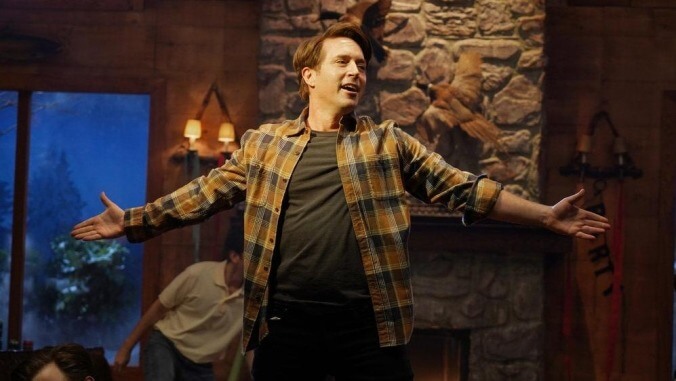Goodbye to Beck Bennett, who quietly became one of Saturday Night Live’s best
Bennett filled roles similar to classic SNL players like Phil Hartman and Will Ferrell.

After a departure-teasing finale and a summer of speculation, the full cast for season 47 of Saturday Night Live has been confirmed, with plenty of news: First, Kate McKinnon, Pete Davidson, Cecily Strong, and Aidy Bryant have all re-upped for at least one more reason, suggesting that the rumored Lorne Michaels master plan to convince familiar faces to stick around through the show’s 50th season may actually come to fruition. Second, three new cast members have been added to the already-swollen ensemble. And third, the long-standing cast member departing the show after nearly a decade isn’t Strong or Davidson, as last season’s finale seemed to imply. Nor is it Kenan Thompson, who confirmed on September 19 that he’s staying put. It’s Beck Bennett, leaving after eight seasons at SNL. (Featured player Lauren Holt is also gone after a single season, giving the distinct impression that the show gave her the short shrift.)
Though it’s sad to hear this news via last-minute announcement, a coded send-off during season 46 wouldn’t have felt right, either. Bennett’s contributions were rarely as showy as the biggest SNL stars. Though he seemed to have been hired, along with frequent comedy partner Kyle Mooney, to do Lonely Island-style filmed pieces, by his last few seasons he was a delightful fixture in traditional sketches, too. He wasn’t a master of recurring characters, at least not in the manner to which SNL fans are accustomed. In fact, his occasional character bits felt like grotesqueries of the form—the ultimate example being Chuckie Chocolate, a wonderfully bewildering piece that did not achieve David S. Pumpkins-style viral success. That sketch has since been unceremoniously pulled from the show’s official YouTube, and Chuckie Chocolate did not make a return appearance.
But Chuckie Chocolate does underline Bennett’s specialty in playing dopes, dads, bad boyfriends, dudes with fragile yet unearned confidence in their abilities, and other average (which is to say, below-average) white guys. In an Avengers-themed bit where host Scarlett Johansson watched as cast members were dusted, Bennett summed up his whole thing with a panicked lament as he disappeared: “Who’s going to play the dumb idiot?!” He filled roles similar to classic SNL players like Phil Hartman (nicknamed “the glue” for his ability to hold the show together) and Will Ferrell (whose bravado barely concealing child-like panic is all over some of Bennett’s characters).
Hartman and Ferrell both joined the show when it was far more male-dominated; the latter felt like a reassertion of the show’s male energy, despite coming up with Molly Shannon and Cheri Oteri (Ferrell alone became a massive film star with three-volume set of SNL best-of DVDs). Bennett, by contrast, arrived in 2013, after the domination of Kristen Wiig, and immediately following the departures of Bill Hader, Jason Sudeikis, and Fred Armisen. Bennett and Mooney didn’t feel positioned to inherit the roles of the latter, as they spent a fair amount of time making awkward hay of early-’90s sitcom tropes and niche-driven personality types like their “Inside SoCal” boys. The big stars of Bennett’s years on the show were McKinnon, Bryant, Strong, and, as ever, Thompson.
But Bennett eventually refined and redefined the show’s need for a go-to white guy for an era that felt, finally, less intensely oriented toward those white guys. While not as chameleonic as Hartman, he was similarly adept at blending into the scene—he could read a few lines, using his deep-voiced or chortling insecurity to score a laugh from the margins of someone else’s sketch, and move on. With Ferrell, he shared a satirical instinct for savaging fumbling attempts at masculinity. Sometimes this took the form of dads who would bumble outside the bounds of chummy shtick, into someplace darker and stupider, like the guy who wants brandish a shotgun in his daughter’s prom photo, only to literally shoot his junk off and be horrifically confronted with his own powerlessness. Other times, he almost seemed to be spoofing the crowd-pleasing boyishness of cast members like Jimmy Fallon or Pete Davidson, playing a nervous boyfriend who affects a high-pitched voice and challenges his girlfriend’s parents to come find him or an overgrown child who can’t stop grappling with his brother.
His weirdly empathetic travestying of hapless men also made him a useful impressionist; he wouldn’t channel voices or mannerisms so much as lampoon the men in question by impersonating them at all, turning them into Beck Bennett dolts. He memorably reimagined Tom Brady as a drunken buffoon, and in his final big sketch, he mastered an impression no one on the show had quite managed before: Vin Diesel, waxing serenely rhapsodic about the mundane rituals of the movies. Bennett was a true utility player, somehow capable of killing it in sketches without pulling focus. He seemed conscious of this role, too, doing sketches like the one where he and Mooney monopolize a conversation about harassment and microaggressions. He never seemed to be mentally preparing for a starring-vehicle movie that would showcase the likability he happily shunned.
This season will almost certainly lack that crucial utility. There’s never a shortage of white dudes waiting in the SNL wings; one of the three new featured players fills that demographic. But Bennett is one of the few SNL guys who felt like he was following in the footsteps of Ferrell, one of the best to ever do it; his alpha-turned-beta clowning felt both self-contained and flexible, never depending on another male cast member to serve as a more successful counterpart. (Set against Mooney, they’d compete to see who looked more ridiculous.) It’s fitting that he went out in an episode where he shot his genitals off and expertly assayed Vin Diesel, never mentioning his impending departure; he was just as quiet about assuming his place in the show’s firmament.